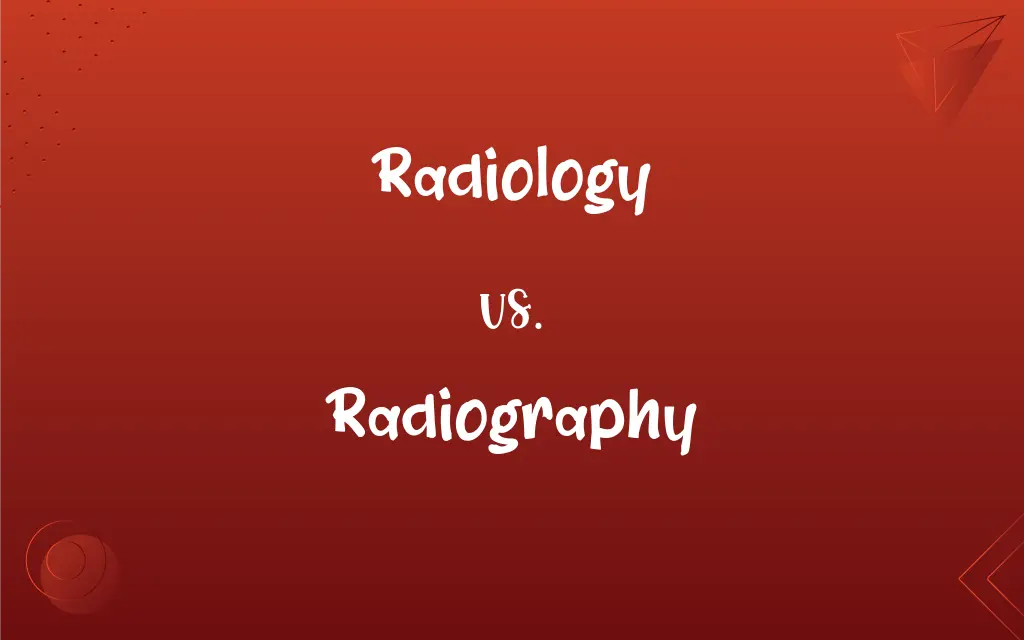Radiology vs. Radiography: What's the Difference?
Edited by Janet White || By Harlon Moss || Published on January 31, 2024
Radiology is the medical specialty involving the use of imaging to diagnose and treat diseases, while radiography is the process of creating these images.

Key Differences
Radiology refers to the branch of medicine concerned with the use and interpretation of diagnostic imaging technologies, including X-rays, CT scans, and MRIs. It involves diagnosing and sometimes treating diseases. Radiography, on the other hand, specifically denotes the technique and process of creating these medical images. Radiography is an integral part of radiology, but it focuses more on the technical aspect of capturing images.
Radiology encompasses a broader spectrum, often involving the use of radiographic images for clinical decision-making. It includes the interpretation of imaging, deciding on appropriate imaging techniques, and integrating these findings into medical care. Radiography is a subset of radiology, primarily concerned with the operation of imaging equipment and the acquisition of images.
Radiologists, professionals in radiology, are medical doctors with specialized training in interpreting medical images and providing diagnoses. They may also perform interventional procedures guided by imaging. Radiographers or radiologic technologists, key players in radiography, are trained to operate imaging equipment and ensure the quality of the images produced.
Radiology often requires additional specialization in areas like interventional radiology, pediatric radiology, or neuroradiology. It's a field that demands a deep understanding of various medical conditions. Radiography focuses more on the technical and procedural aspects of obtaining clear and accurate images, which are then used by radiologists for diagnostic purposes.
Radiology is pivotal in managing patient care, influencing treatment decisions, and providing vital information about a patient's health. It's an interpretive science. Radiography is more about the application of physics, anatomy, and technology to produce diagnostic images. It's a technical and practical field.
ADVERTISEMENT
Comparison Chart
Primary Focus
Diagnosis and treatment using images
Production of diagnostic images
Practitioner
Radiologist (Medical Doctor)
Radiographer or Radiologic Technologist
Educational Requirement
Medical degree and specialized training
Technical training in image acquisition
Role in Patient Care
Interpretation and integration of imaging
Operation of imaging equipment
Scope of Practice
Broader medical decisions
Focused on image quality and safety
ADVERTISEMENT
Specializations
Various subspecialties in imaging
Specialization in types of imaging techniques
Involvement in Treatment
Can perform interventional procedures
Primarily involved in diagnostic process
Interpretation of Images
Core responsibility
Not typically responsible
Clinical Decision-Making
Integral part
Limited involvement
Interaction with Patients
Often indirect, more with medical staff
Direct interaction during imaging procedure
Radiology and Radiography Definitions
Radiology
Medical science of using imaging to diagnose and treat diseases.
The radiology report helped diagnose the patient's condition accurately.
Radiography
The process of using radiation to produce images of the body's interior.
Radiography revealed the presence of a foreign object in the patient's abdomen.
Radiology
A branch of medicine applying radioactive substances in diagnosis and treatment.
Advances in radiology have revolutionized cancer treatment.
Radiography
The practice of operating imaging equipment for diagnostic purposes.
His expertise in radiography was evident in the high-quality images he produced.
Radiology
The field of medicine involving interpretation of images for medical diagnosis.
She specialized in radiology to improve diagnostic accuracy in complex cases.
Radiography
The technique of creating diagnostic images using X-rays.
She studied radiography to become a skilled radiologic technologist.
Radiology
The science dealing with X-rays for medical diagnosis and therapy.
Radiology played a crucial role in detecting the bone fracture.
Radiography
Art and science of producing medical images using radiographic techniques.
Advancements in radiography have improved image clarity and reduced exposure risks.
Radiology
Medical specialty focused on imaging techniques for health care.
His interest in radiology stemmed from a desire to combine technology and medicine.
Radiography
The process by which radiographs are made. Also called skiagraphy.
Radiology
The branch of medicine that deals with diagnostic images of anatomic structures made through the use of electromagnetic radiation or sound waves and that treats disease through the use of radioactive compounds. Radiological imaging techniques include x-rays, CT scans, PET scans, MRIs, and ultrasonograms.
Radiography
The process of making radiographs, and the science of analyzing them
Radiology
The use of radiation for the scientific examination of material structures; radioscopy.
Radiography
Art or process of making radiographs, radiograms, or autoradiograms.
Radiology
(medicine) The specialty of medical imaging and its interpretation, originally and especially radiography#Noun but now including all imaging modalities, including ones that use no radiation#Noun (such as ultrasonography and magnetic resonance imaging).
Radiography
The process of making a radiograph; producing an image on a radiosensitive surface by radiation other than visible light
Radiology
The use of radioactive substances in diagnosis and treatment (which today is the province of nuclear medicine).
Radiography
Photography that uses other kinds of radiation than visible light
Radiology
The branch of medical science dealing with the medical use of X-rays or other penetrating radiation
Radiography
The technical aspect of capturing medical images using radiation.
Radiography requires precise knowledge of imaging technology and patient safety.
Radiology
(radiology) examination of the inner structure of opaque objects using X rays or other penetrating radiation
FAQs
What is radiology?
Radiology is the medical specialty that uses imaging techniques for diagnosis and treatment.
What does a radiologist do?
A radiologist interprets medical images to diagnose and sometimes treat diseases.
What is radiography?
Radiography is the technique of producing diagnostic images, such as X-rays.
Who performs radiography?
Radiographers or radiologic technologists perform radiography.
Can radiographers diagnose conditions?
No, radiographers capture images, but diagnosis is typically done by radiologists.
What education is required for radiography?
Radiography requires technical training in imaging technology.
Do radiologists see patients?
Radiologists primarily interpret images and may have limited patient interaction.
Are radiologists doctors?
Yes, radiologists are medical doctors with specialized training in imaging.
Is radiography the same as X-ray?
Radiography includes X-ray techniques but can also involve other imaging methods.
Do radiologists perform surgery?
Some specialized radiologists perform interventional procedures but not traditional surgery.
Can radiography detect cancer?
Yes, radiography techniques like mammography can detect cancer.
Is radiology safe?
Radiology is generally safe, but it involves careful use of radiation.
How does radiology help in treatment?
Radiology provides images that guide treatment decisions and procedures.
How long does radiography training take?
Radiography training varies but often takes 2-4 years.
Is a referral needed for radiology services?
Typically, a healthcare provider's referral is needed for radiology services.
Can radiography be used for dental imaging?
Yes, dental radiography is commonly used in dentistry.
Is there a difference in salary between radiologists and radiographers?
Yes, radiologists, as medical doctors, generally have higher salaries than radiographers.
Are radiologists involved in emergency care?
Yes, radiologists play a crucial role in diagnosing emergency conditions.
What are the risks of radiography?
The main risk is radiation exposure, which is minimized with safety protocols.
Can radiology detect all diseases?
While radiology is a powerful diagnostic tool, it may not detect every condition.
About Author
Written by
Harlon MossHarlon is a seasoned quality moderator and accomplished content writer for Difference Wiki. An alumnus of the prestigious University of California, he earned his degree in Computer Science. Leveraging his academic background, Harlon brings a meticulous and informed perspective to his work, ensuring content accuracy and excellence.
Edited by
Janet WhiteJanet White has been an esteemed writer and blogger for Difference Wiki. Holding a Master's degree in Science and Medical Journalism from the prestigious Boston University, she has consistently demonstrated her expertise and passion for her field. When she's not immersed in her work, Janet relishes her time exercising, delving into a good book, and cherishing moments with friends and family.































































